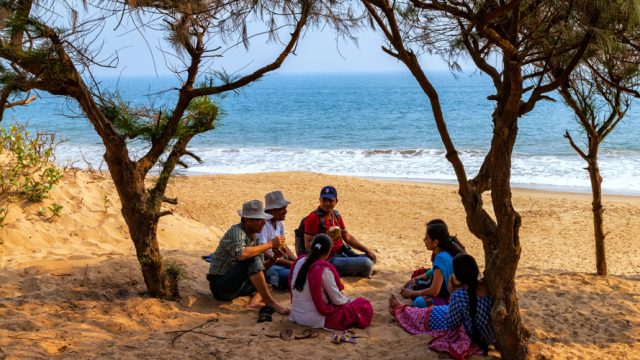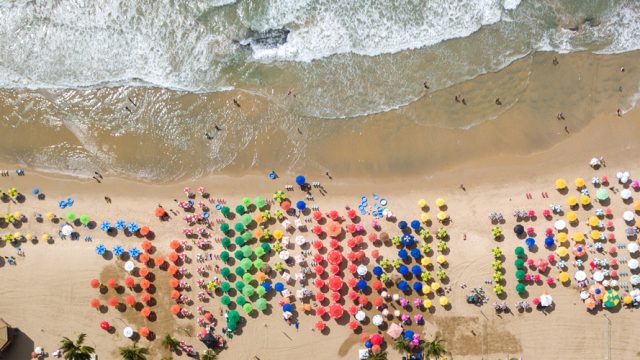Playa del Amor, Marieta Islands, Mexico Panalu’u Black Sand Beach, Hawaii Giants Causeway, Ireland Glass Beach, California Vaadhoo Island, Maldives 
Playa del Amor, popularly known as the Hidden Beach is located on Marieta Islands in Mexico looks like it is right out of a fairytale. With the turquoise blue waters of the Pacific gushing into a sprawling cave, it almost looks like a place right out of a fantasy novel. The islands are an archipelago and have always been uninhabited, making them ideal sites for military testing by the Mexican government. Rumour has it that it were test bombs that caused this stunning formation. The islands were declared a national park, Parque Nacional Islas Marietas in 2005. Swimming, kayaking, sunbathing are some of the activities you can enjoy on the islands.
This natural wonder of a beach in Hawaii has a sand of a deep, black color lending it an almost post-apocalyptic look. The black sand of Punaluʻu is made up of basalt that has washed up on the shores from beneath the waves. It is formed due to the streams of lava flowing underwater over-heating rocks and causing them to explode, just off shore. The area is also home to a variety of endangered wildlife species such as the Hawaiian Monk Seal and Hawksbill Turtle.
The Giant’s Causeway is one of the oddest geological formations that almost man-made because of their shape and precision. These step-like interlocking hexagonal columns were born of natural processes during the Paleogene (65-23 million years ago), when the north of Ireland was undergoing massive volcanic activity. A lava plateau was formed when molten basalt came into contact with chalk beds and when it cooled down, the plateau contracted and cracked into tens of thousands of hexagonal columns of varying heights. The tallest of these is almost 36 feet in height. Some other examples of unique rock formations include Devil’s Postpile in California, Fingal’s Cave in Scotland and Los Prismas Basálticos in Mexico.
In the early 1900s, everything from discarded appliances, glass and even cars were dumped off the cliffs on to the beach below by the residents of Fort Bragg. The Dumps, as the area was known then was owned by the Union Lumber Company. As The beach began to accumulate huge quantities of rubbish, fires were lit to burn them down to reduce their size. Post 1967, the local leaders undertook a multitude of clean-up drives after realizing the damage they had caused. Over the next couple of decades, powerful waves cleansed the beach, turning the discarded glass into the small, smooth, colored pebbles . Finally in 2002, 38-acre property of Glass Beach was sold to the California State Park system and it became a part of the MacKerricher State Park.
Most of us are quite familiar with this out-of-worldly phenomena that occurs on the shores of Ra Atoll in Maldives made popular by Ang Lee’s Life of Pi. Commonly known as the ‘sea of stars’, it is caused by bioluminescent phytoplankton, a tiny organism that often appear in warm coastal waters and glows when it is under stress.
5 Unique Beaches
Ireland
California





